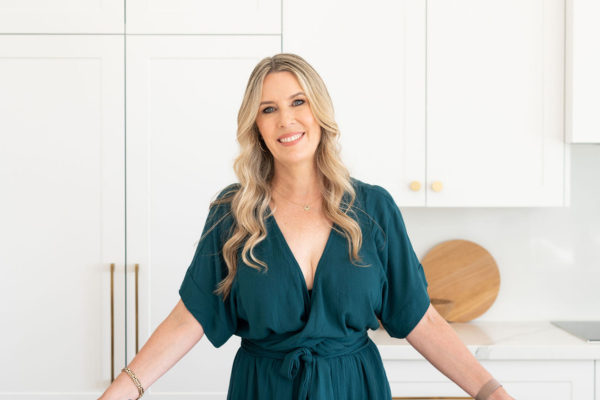
As if navigating the hormonal changes of perimenopause wasn’t challenging enough, many women (including myself!) also find themselves grappling with an increase in eczema symptoms during this phase of life, or in my case, eczema for the first time! Yippee!! So my friend, I’m here to help by helping you understand this connection and provide you with some practical tips to manage eczema during perimenopause. So, let’s get started!
Understanding the Connection Between Peri/Meno and Skin
Skin changes are a symptom of fluctuating hormones in women as I’ve outlined in the past couple of blogs and episodes of The Ageless and Awesome Podcast.
The three primary hormones that affect the skin are:
1. Progesterone: Supports oestrogen and keeps skin moist and supple.
2. Oestrogen: Helps with collagen production and maintains skin thickness.
3. Testosterone: Manages sebum production and helps with elasticity.
Of these, oestrogen levels plays the most significant role in your skin health. Oestrogen, also known as estradiol, is a hormone closely linked to the female reproductive system and organs, however it also impacts the body in a number of other functions.
For example:
– At puberty, oestrogen helps with the growth of long bones and the fusion of growth plates AND protects bones throughout life, preventing osteoporosis.
– During puberty and pregnancy, oestrogen encourages the growth of mammary ducts.
– Oestrogen provides lubrication and moisture to vaginal epithelial mucosal cells.
– Cardiovascular health benefits from oestrogen because it reduces LDL ( “bad cholesterol”) and increases HDL (“good cholesterol”).
Along with these essential functions in your body, oestrogen plays a critical role in keeping skin supple, elastic, and smooth.
Skin Health and Eczema
Some skin dryness comes from the ageing process. As we get older, our skin becomes less watertight and both men and women experience thinner epithelial layers which allows moisture to evaporate through the skin more quickly.
For women, dry skin also comes from the loss of oestrogen during perimenopause. The skin-smoothing collagen and moisturising oils in the skin are supported with oestrogen so as oestrogen levels drop, a loss of collagen and nourishing oils occurs. Without enough collagen and skin oils, skin becomes less able to retain moisture, making it dry, itchy, and flaky.
Atopic dermatitis, also known as eczema, causes itchy skin, scaly patches, blisters, and dry skin. Although eczema can occur at any time in a person’s life, perimenopause can create the perfect storm for eczema symptoms to appear. In addition to hormonal imbalance, the pH level of perimenopause skin begins to change when a woman nears 50 years of age. Skin can become sensitive and less resilient, resulting in menopause-associated face rashes or eczema. Fabrics, dyes, perfumes, and stress can induce skin reactions much more quickly during perimenopause.
This was certainly the case for me. To listen to my story on The Ageless and Awesome Podcast.
Hormone imbalance is the primary cause of eczema during perimenopause (shocker, right?!?). Diminished oestrogen levels cause the skin to become more reactive to internal and environmental triggers. In addition, age and hormonal imbalance prevent the skin from healing as quickly as it used to, resulting in persistent eczema symptoms. Therefore, women with a previous history of eczema may experience a significant recurrence of their symptoms. For these women, eczema and menopause may go hand in hand.
Managing Eczema in Peri/Menopause
Moisturise, Moisturise, Moisturise!
One of the most crucial steps in managing eczema is to keep your skin well-hydrated. Opt for fragrance-free and hypoallergenic moisturisers to avoid any potential irritants. Also be mindful of using natural ingredients wherever possible to avoid endocrine disrupting chemicals that can further contribute to hormone fluctuations. Apply moisturiser immediately after bathing to lock in the moisture. Consider using thicker ointments or creams rather than lotions (especially in the cooler, drier months), as they provide a stronger barrier for your skin.
Choose Gentle and Fragrance Free Products
Perimenopause itself can be a stressful time due to the various physical and During perimenopause, your skin may become more sensitive, so it’s essential to choose gentle skincare and household products. Avoid harsh soaps, detergents, and other potential irritants that may exacerbate your eczema symptoms. Opt for products labeled as “fragrance-free” or “hypoallergenic” to minimise the risk of skin irritation.
Manage Your Stress
Stress can trigger or worsen eczema symptoms. Perimenopause itself can be a stressful time due to the various physical and emotional changes you may be experiencing plus the life stressors in our 40s/50s can be increased. Engage in stress-reducing activities such as deep breathing exercises, yoga, meditation, or engaging in anything that brings you joy. Taking care of your mental well-being can have a positive impact on your skin.
Nourish Your Body
A nourishing diet with the ideal foods for your skin and hormones can work wonders for your skin health. Include foods rich in omega-3 fatty acids, such as fatty fish (salmon, mackerel), chia seeds, and walnuts. These healthy fats have anti-inflammatory properties that may help reduce eczema flare-ups. Avoid potential trigger foods like dairy, gluten, and certain spices, as they can worsen inflammation in some individuals or get your very own personalised nutrition plan in The Glow Protocol™️ so that you know the EXACT foods for your optimal health. It was life changing for me and my skin.
Consult a Practitioner
If your eczema symptoms become severe or you just can’t seem to get on top of it, it’s best to seek professional help. A qualified Health Care Practitioner, (err…like me!) can provide personalised advice and recommend the best management plan for your situation. You’ll be so glad you did.
Of course, this is general advice and not a personalised protocol. If you’re look for a more personalised approach and a protocol with the EXACT strategy for your individual biochemistry, then click this link to learn more.

Susie Garden | Clinical Nutritionist & Naturopath
Are you a woman feeling stressed, flat and experiencing the challenges of peri/menopause?
It’s time to reclaim your youthful energy, radiance and self-assurance (and your ideal weight).
I’m here to help with my proven method.
Book your complimentary Pre-Screening Call here, and let’s see how I might help you.
